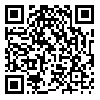Volume 26, Issue 4 (Winter- In Press 2026)
jrehab 2026, 26(4): 0-0 |
Back to browse issues page
Ethics code: IR.USWR.REC.1403.130
Download citation:
BibTeX | RIS | EndNote | Medlars | ProCite | Reference Manager | RefWorks
Send citation to:



BibTeX | RIS | EndNote | Medlars | ProCite | Reference Manager | RefWorks
Send citation to:
Faqihi T, Sadeghi Z, Ghoreishi Z S, Mokhlessin M, Vahedi M, Bagherpour P. Translation, Cultural Adaptation, and Psychometric Evaluation of the Infant and Child Feeding Questionnaire (ICFQ). jrehab 2026; 26 (4)
URL: http://rehabilitationj.uswr.ac.ir/article-1-3662-en.html
URL: http://rehabilitationj.uswr.ac.ir/article-1-3662-en.html
Tayebeh Faqihi1 
 , Zahra Sadeghi *2
, Zahra Sadeghi *2 
 , Zahra Sadat Ghoreishi1
, Zahra Sadat Ghoreishi1 
 , Maryam Mokhlessin3
, Maryam Mokhlessin3 
 , Mohsen Vahedi4
, Mohsen Vahedi4 
 , Pouran Bagherpour5
, Pouran Bagherpour5 


 , Zahra Sadeghi *2
, Zahra Sadeghi *2 
 , Zahra Sadat Ghoreishi1
, Zahra Sadat Ghoreishi1 
 , Maryam Mokhlessin3
, Maryam Mokhlessin3 
 , Mohsen Vahedi4
, Mohsen Vahedi4 
 , Pouran Bagherpour5
, Pouran Bagherpour5 

1- University of Social Welfare and Rehabilitation Sciences, Tehran, Iran.
2- University of Social Welfare and Rehabilitation Sciences, Tehran, Iran. ,z.sadeghi.st@gmail.com
3- Neuromuscular Rehabilitation Research Center, Semnan University of Medical Sciences, Semnan, Iran, Neuromuscular Rehabilitation Research Center, Semnan University of Medical Sciences, Semnan, Iran
4- Department of Biostatistics, University of Social Welfare and Rehabilitation Sciences, Tehran, Iran, Department of Biostatistics, University of Social Welfare and Rehabilitation Sciences, Tehran, Iran
5- School of Rehabilitation Sciences, Faculty of Health Sciences, University of Ottawa, Ottawa, Canada
2- University of Social Welfare and Rehabilitation Sciences, Tehran, Iran. ,
3- Neuromuscular Rehabilitation Research Center, Semnan University of Medical Sciences, Semnan, Iran, Neuromuscular Rehabilitation Research Center, Semnan University of Medical Sciences, Semnan, Iran
4- Department of Biostatistics, University of Social Welfare and Rehabilitation Sciences, Tehran, Iran, Department of Biostatistics, University of Social Welfare and Rehabilitation Sciences, Tehran, Iran
5- School of Rehabilitation Sciences, Faculty of Health Sciences, University of Ottawa, Ottawa, Canada
Abstract: (743 Views)
Objective: Feeding disorders in children are considered one of the major public health challenges. These disorders can lead to problems such as developmental delays, cognitive impairments, weight loss, immune system dysfunction, and an increased risk of infectious diseases. Furthermore, feeding disorders may have long-term negative effects on children's psychological, physical, and social development, ultimately lowering their quality of life and increasing the healthcare burden on families and the healthcare system. Early diagnosis of feeding problems during childhood plays a critical role in preventing more serious complications. Given the high prevalence of these disorders and their impact on child and family health, using validated tools for screening and early intervention is of great importance. This study aimed to translate the Infant and Child Feeding Questionnaire (ICFQ) and assess its psychometric properties in Persian-speaking children.
Materials & Methods: This psychometric study was conducted on 220 children aged 0–4 years (100 children with feeding disorders and 120 typically developing children). The translation process included forward and backward translation, expert panel review, and assessment of face validity. Content validity was evaluated using the Content Validity Index (CVI), and construct validity was assessed through convergent validity using the Pedi-EAT questionnaire and known-groups validity. Criterion validity and diagnostic accuracy were examined by calculating sensitivity, specificity, and cut-off points. Data analysis was performed using SPSS version 25, and appropriate statistical tests such as Pearson’s correlation coefficient, independent t-test, Chi-square test, and ROC analysis were used to assess the psychometric properties of the instrument.
Results: The Content Validity Index (CVI) was 0.95, indicating excellent content validity. The Persian version of the ICFQ showed a significant correlation with the Pedi-EAT questionnaire, with a correlation coefficient of 0.46 (p < 0.01). Agreement with specialists' diagnoses was reported at 90.3% (Chi-square = 157.03, p < 0.001). The area under the receiver operating characteristic (ROC) curve was 0.97, with a 95% confidence interval ranging from 0.96 to 0.99. The optimal cut-off point was determined to be 2.5, yielding a sensitivity of 93% and a specificity of 91.7%.
Conclusion: The Persian version of the ICFQ is a valid tool for screening feeding disorders in Persian-speaking children and can be used in both clinical and research settings.
Materials & Methods: This psychometric study was conducted on 220 children aged 0–4 years (100 children with feeding disorders and 120 typically developing children). The translation process included forward and backward translation, expert panel review, and assessment of face validity. Content validity was evaluated using the Content Validity Index (CVI), and construct validity was assessed through convergent validity using the Pedi-EAT questionnaire and known-groups validity. Criterion validity and diagnostic accuracy were examined by calculating sensitivity, specificity, and cut-off points. Data analysis was performed using SPSS version 25, and appropriate statistical tests such as Pearson’s correlation coefficient, independent t-test, Chi-square test, and ROC analysis were used to assess the psychometric properties of the instrument.
Results: The Content Validity Index (CVI) was 0.95, indicating excellent content validity. The Persian version of the ICFQ showed a significant correlation with the Pedi-EAT questionnaire, with a correlation coefficient of 0.46 (p < 0.01). Agreement with specialists' diagnoses was reported at 90.3% (Chi-square = 157.03, p < 0.001). The area under the receiver operating characteristic (ROC) curve was 0.97, with a 95% confidence interval ranging from 0.96 to 0.99. The optimal cut-off point was determined to be 2.5, yielding a sensitivity of 93% and a specificity of 91.7%.
Conclusion: The Persian version of the ICFQ is a valid tool for screening feeding disorders in Persian-speaking children and can be used in both clinical and research settings.
Type of Study: Original |
Subject:
Speech & Language Pathology
Received: 14/07/2025 | Accepted: 15/11/2025 | Published: 1/03/2026
Received: 14/07/2025 | Accepted: 15/11/2025 | Published: 1/03/2026
Send email to the article author
| Rights and permissions | |
 |
This work is licensed under a Creative Commons Attribution-NonCommercial 4.0 International License. |





